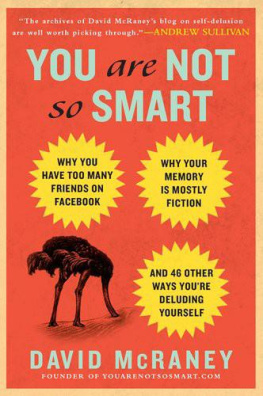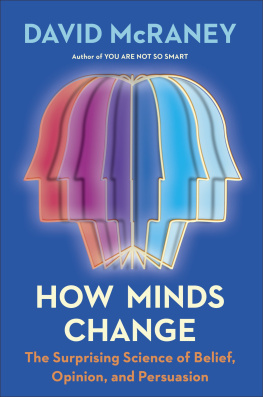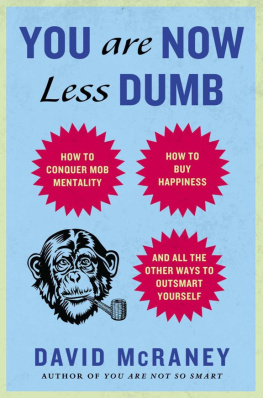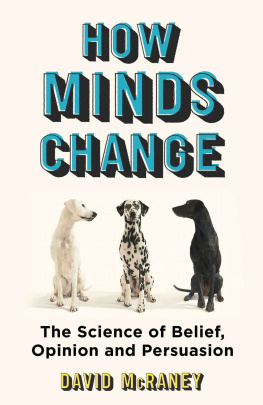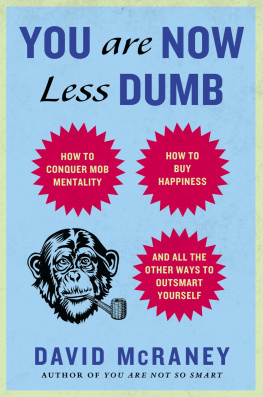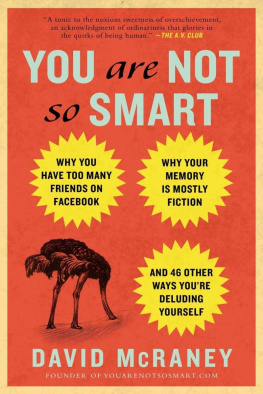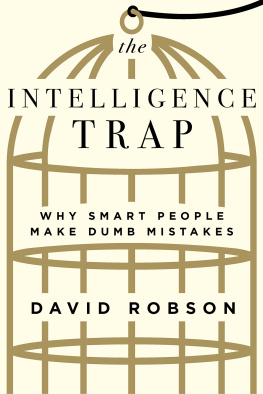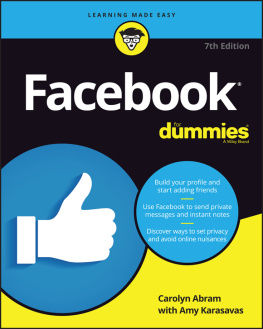ACKNOWLEDGMENTS
A super-tight hug goes out to Erin Malone, who found my blog and believed it should exist in physical form. Through her confidence and hard work it now does. Thank you so much.
Thanks too to Patrick Mulligan, who got it early on and then slashed and questioned the original manuscript until it made sense. Im fortunate to have had such a plugged-in editor.
Boundless thanks go out to my wife, Amanda, who read this book as it came together and kept it from going off the rails many times.
In many ways this book and the blog from which it sprang started in a psychology class I took seven years after graduating from high school.
After getting married, my wife and I sold all our possessions and traveled to Germany for no other reason than to see what would happen. We had both gone to a tiny school in a small town in Mississippi, and we both worked the sort of jobs that went along with those foundationswaiting tables, construction, selling coats. Escaping into a strange adventure made a lot of sense at the time. As tramps abroad, we were shocked at not only how naive we were, but how uneducated. We swore to each other when we got back to the States we would get college degrees.
One of our first college experiences was an incredibly challenging and life-changing courseIntroduction to Psychology, taught by one extraordinary teacher, Jean Edwards.
Edwardss class wasnt like the other courses. Nothing about it was remedial. She came every day with a laptop and a projector and used videos, photos, animations, and diagrams to detail the intricacies of how the mind worked. The textbook was an afterthought, a supplement. In her class, she used presentations labored over for years to boggle our minds and shake us out of our delusions. She made us stand up and perform, she put us in and out of groups, she pointed at our faces and made us talk. When the tests landed on our desks, there was no memorization, there were no word banks. Every question was a puzzle that required a deep understanding of the material to unfurl and solve. Once we went on to a full university, my wife and I were astonished to find no course ever compared to hers.
In one class, she asked us to imagine a man who woke up every day and wrapped his entire body in newspaper before putting on his clothes. He worked hard, provided for his family, and hurt no one. At the end of the day, he would discreetly remove his wrappings before going to bed. She then asked, Is this person crazy? For an hour, the class argued about it. Most peoples knee-jerk reaction was Yeah, obviously. She nursed the conversation, pointing out our ignorance, asking us to examine our own quirks and neurotic habits. By the end of the class the students had reached a consensus: The newspaper man was as deluded as the rest of us, and therefore not crazy.
Every class with Edwards was revelatory, not just because of the overwhelming number of eye-opening facts and epiphanies, but also because she showed people like me and my wife there were kindred spirits out there. She had no problem losing an hour of her day to an after-class conversation, and she was always ready to subvert the norms and expectations of her pupils and peers. She made it safe and respectable to be different, and she provided her students with a role model they didnt know was an option before meeting her. She was a smart, successful, professional woman who questioned everything and dared you to join her. This book, and the blog that led to it, started in that class.
So, I thank you, Jean Edwards. You changed my life and tilted my view of the world permanently.
BIBLIOGRAPHY
Introduction
Nyhan, B., & Reifler, J. (2010). When corrections fail: the persistence of political misperceptions. Political Behavior 32(2), 303330.
Munro, G. D., & Ditto, P. H. (1997, June). Biased assimilation, attitude polarization, and affect in reactions to stereotype-relevant scientific information. Personality and Social Psychology Bulletin 23(6), 636653.
Munro, G. (2010). The scientific impotence excuse: discounting belief-threatening scientific abstracts. Journal of Applied Social Psychology 40(3), 579600.
Priming
Bargh, J. A., & Chartrand, T. L. (1999, July). The unbearable automaticity of being. American Psychologist 54(7), 462479.
Bargh, J. A., Chen, M., & Burrows, L. (1996). Automaticity of social behavior: direct effects of trait construct and stereotype activation on action. Journal of Personality and Social Psychology 71(2), 230244.
Bargh, J. A., & Wyer, R. S. (1997). The automaticity of everyday life. London: Psychology Press.
Carey, B. (2007, July 31). Whos minding the mind? New York Times.
Friedman, R., & Elliot, A. J. (2008, November). Exploring the influence of sports drink exposure on physical endurance, Original Research Article. Psychology of Sport and Exercise 9(6), 749759.
Kay, A. C., Wheeler, S. C., Bargh, J. A., & Ross, L. (2004). Material priming: The influence of mundane physical objects on situational construal and competitive behavioral choice. Organizational Behavior and Human Decision Processes 95, 8396.
Zhong, C., & Liljenquist, K. (2006). Washing away your sins: threatened morality and physical cleansing. Science 313(5792), 14511452.
Confabulation
Fiala, B., & Nichols, S. (2009). Confabulation, confidence, and introspection. Behavioral and Brain Sciences 32(2), 144145.
Hirstein, W. (2005). Brain fiction: Self-deception and the riddle of confabulation. Cambridge, Mass: MIT Press.
Joseph, R. (1986). Confabulation and delusional denial: Frontal lobe and lateralized influences. Journal of Clinical Psychology 42, 845860.
Mandler, G. (1985). Cognitive psychology: An essay in cognitive science. Hillsdale, N.J.: L. Erlbaum Associates.
Nisbett, R. E., & Wilson, T. D. (1977, May). Telling more than we can know: Verbal reports on mental processes. Psychological Review 84(3), 231259.
Pantel, J. (2006, March). Brain fiction: Self-deception and the riddle of confabulation: Review. American Journal of Psychiatry 163, 559.
Ramachandran, V. S. (2009, January 10). Self-awareness: The last frontier. Retrieved December 2010 from http://integral-options.blogspot.com/2009/01/vs-ramachandran-self-awareness-last.html.
Sapolsky, R. (1995, November 1). Ego boundaries, or the fit of my fathers shirt: A neuroscientist racks his brains to find where one person ends and another begins. Discover. Retrieved December 2010 from http://discovermagazine.com/1995/nov/egoboundariesort586.
Zaidel, E., Zaidel, D. W., & Bogen, J. E. (n.d.). The split brain. Retrieved December 2010 from http://www.its.caltech.edu/~jbogen/text/ref130.htm.
Confirmation Bias
Knobloch-Westerwick, S., & Meng, J. (2009, June). Looking the other way: Selective exposure to attitude-consistent and counter attitudinal political information. Communication Research 36(3), 426448.
Krebs, V. (2008). New Political Patterns. Retrieved December 2010 from http://www.orgnet.com/divided.html.
Krebs, V. (2000, March). Working in the connected world: Book network. IHRIM Journal, 8790.
LaMarre, H. L., Landreville, K. D., & Beam, M. A. (2009, April). The irony of satire: Political ideology and the motivation to see what you want to see in The Colbert Report. The International Journal of Press/Politics 14(2), 212231.
Marks, M. J., & Fraley, R. C. (2006, January). Confirmation bias and the sexual double standard. Sex Roles

